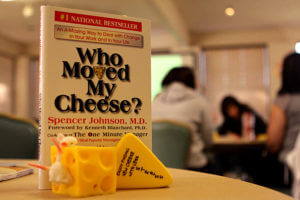 Who doesn’t like a good book that you’ve enjoyed reading and learned a few nuggets of knowledge from the author? Case in point, Who Moved My Cheese by Spencer Johnson and Kenneth Blanchard. It’s an easy reading parable about a couple of mice in a maze looking for, what else, Cheese. Being a parable, it is generously peppered with metaphors related to the pursuit of goals. Continue reading “This Will Help You Be Prepared For Change Before It Happens”
Who doesn’t like a good book that you’ve enjoyed reading and learned a few nuggets of knowledge from the author? Case in point, Who Moved My Cheese by Spencer Johnson and Kenneth Blanchard. It’s an easy reading parable about a couple of mice in a maze looking for, what else, Cheese. Being a parable, it is generously peppered with metaphors related to the pursuit of goals. Continue reading “This Will Help You Be Prepared For Change Before It Happens”
Tag: #goals
Appreciating Life’s Obstacles
Every year between Christmas and New Year’s Eve, I have developed the habit of cleaning out my home office and discarding items that are no longer relevant for the upcoming year. Like most people, I tend to hang on to a few things that I believe I can use in the future. Things like old swimming goggles that no longer have any elastic left in the strap, old watch batteries, or loose screws that belong to something. Last but not least, a Palm Pilot, an iPod, and a stack of old iPhones that still somehow fire up when fully charged. I keep these items in a special place, you, know, just in case I need them.
I have the magazine page below hanging in my office since 2003. I believe it is from Men’s Health Magazine or Experience Life Magazine. Either one, it captured my attention enough to tear it out and hang it in my home office.
This year, I decided to scan it to secure an electronic version since it’s starting to fade.
While I went that far, I decided to make a quickie blog post of it.
Have a read through the page below.
Take a second reading, but this time, read it again, more thoughtfully and with Gratitude.
There, now you have an achievable New Year’s goal that you can work on daily,

Bottom Line #1.
Most fail at New Year’s Resolutions because the goal is too big and too difficult to measure and monitor.
Bottom Line #2.
“Breaking one’s promise is costly, but exceeding it does not appear worth the effort,” concluded the authors of a 2014 paper published in Social Psychological and Personality Science on promises kept, broken, and exceeded.
Strive for something easier and simpler.“Meet your deadlines.”
Enjoy the process of working through your obstacles with a more thoughtful approach.
The Year End Wrap Up
 Happy Holidays.
Happy Holidays.
Thanks for coming back and checking in on the blog.
You’ve probably been wondering why the regular posts have come to a pause. Well, I’ve been focused on a few other things for these past several weeks. I have been reviewing much of the blog content this time of year for a couple of reasons. Mainly to check myself to make sure that I am walking the talk. Nearly forty-four posts contain nuggets of hindsight, resources, and my version of a “bottom line”. Continue reading “The Year End Wrap Up”
What Cooking Has In Common With Personal Finance

Goal setting and execution was covered in several posts this year, and now that we are into the last three months of the year. It’s time for a way-point check-in on your goal execution. Woulda, shoulda, coulda, is not a way to measure progress unless, of course, you shoulda all over yourself. In this case, regrets might be the only measurable thing. One should never measure those unless you want to stack them up and use them for leverage. If that works, go for it. Don’t wait for New Year’s Eve to execute. Continue reading “What Cooking Has In Common With Personal Finance”
How To Set Goals In Two Easy Steps

If you have not noticed, there are small changes in format and functionality made to this website every few weeks. Not only do I try to come up with valuable and creative content, I also learn how to make this website easier to navigate and increase its functionality. For example, this week, I fixed the iPhone/iPad interface bug that now allows comments from those devices. The previous week I added the search box that works. Whenever I am about to make a code or layout change to the website, I go through a backup procedure and keep a copy of all of the files and code offline, just in case I did something stupid and can quickly go back to the functional version. After the change, I test everything I possibly can and have the patience for it. This week’s task was to stress test the search box, and just for fun, I typed the word “Goals” and learned there are ten articles that reference goals.
One of the common underlying themes in articles about goals is that most touch on systematic methods to set goals, a system. Developing systems and workflows is a professional approach to establishing habits. Changing or adapting new habits requires a behavior change. Changing behavior is difficult if one does not recognize that a particular behavior needs to be changed, especially if it is identified as a possible root cause. Let’s look at an example of changing behavior.
There are a couple of blogs that were written to help the reader observe and identify behaviors. One, in particular, was the post on tracking your spending for a week on food, transportation, and entertainment for one week. How many of you made the effort to collect receipts every time you made a purchase? Collecting receipts is one step of a simple system. How many of you summarized the purchases using a notepad or the Excel sheet that was provided? Not many, based on the comments and conversations I’ve had with a few readers, and here’s the reason why. There is a saying in sales that applies to behavior changes.
“A customer won’t purchase until the cost of the problem outweighs the cost of the solution.”
The same principle applies to breakthroughs that create behavior changes. No amount of “would of, should of, could of” will change a behavior until a level of discomfort is more unbearable than implementing a system and creating an action plan to solve a problem or achieve a goal. Even if blog writers or coaches provide tools, techniques, and systems and lay them out and explain how to use them, no one ever will use tools and techniques until a necessary reactive response comes into play, like a decision to change a circumstance or a habit. Developing systematic methods to set and achieve goals creates a more proactive environment, which to me, is certainly more enjoyable than constantly reacting to things. Much worse, solving the same problem over and over again and expecting a different result.
Like many skills that one develops, the secrets, reveal themselves when you know where to look and recognize their significance as they are applied to you. So let’s get back to the headline that brought you into this post and down to this week’s bottom line: How to Develop Your System. Easy, you don’t have to develop your system, you merely borrow it from someone else, implement it, and begin to make subtle changes to make it work for you. This blog contains quite a few systems that started with an idea from my mentors, coaches, authors, leaders, and other bloggers, and took best practices and made them my own. I merely took them to the next level by applying them to the circumstances that I created to achieve the results. You wouldn’t build your hammer or saw to build a birdhouse, would you? Of course not. You would buy a hammer and a saw and look on YouTube to see how someone else did it. You now have the tool and the knowledge, there’s your system. You only need some basic materials and the desire and time to get it done with your own hands, focus, and creative style. Like anything, once you have the system, execution is your own hurdle. Taking those first steps builds momentum. The only way to take those first steps is to make the decision to action and yes, I have a system for that too.
That’s All From The Bach Row.
How To Define Your Success: Back To Basics

Definitions for success can be listed from here and to “infinity and beyond” because everyone has their interpretation of success. These interpretations are usually formulated by what one hears, sees on TV, reads on the internet, or by emulating people whom one admires. Of all the things and meanings that one attributes to success, everyone can ultimately agree that success is not an endpoint, it’s a process. Where everyone splits off in every direction is how success is measured. Jack Welch stated it best when he said, “You get what you measure”. That’s a great quote and it’s also a guideline to keep you honest and focused on the goal. It’s not all about achieving the goal, it’s about what you become striving to achieve the goal. Along the way, you measure milestones to keep yourself on track.
Continue reading “How To Define Your Success: Back To Basics”
How to Enjoy Delayed Gratification

I always wanted two cars from the era of my youth, a 1969 Dodge Charger in Plum Crazy and a 1970 Dodge Challenger in white. Vanishing Point White. For a few years, I researched the time, cost, and effort to restore one of these rare and sought-after cars. In 2008, Dodge came out with the modern version of the Challenger from my youth. Same shape, lines, hood, and deck lid, just beefier, heavier, and with a more aggressive-looking stance. A fantasy turned into a reality, and now a dilemma, restore or buy new.  Continue reading “How to Enjoy Delayed Gratification”
Continue reading “How to Enjoy Delayed Gratification”
The Five Books You Must Read
 When I started my technical sales career at Pharmacia Biotech, the sales department had a well-planned sales and product training program that to this day remains my gold standard of training. It consisted of a comprehensive course: two weeks at headquarters for sales/marketing product lectures, hands-on product training, and Professional Selling Skills training. After the second week, the trainers sent you into your territory with your manager for two weeks applying everything that you just learned. After that, back to HQ to focus on different product areas and more selling skills for another two full weeks and then back into your territory. This cycle repeated for over four months and the team selling/coaching sessions with your manager lasted another three or four months after. During this period, it was also expected that you continue with your self-study on the products and your customer’s business. On top of that, you were required to hit your monthly sales targets and complete your admin duties consistently. It did get a lot easier once you mastered the product line, and your customers, and learned what’s important to manage your manager. (See the 80/20 rule.) This methodology of constant and never-ending improvement became part of a very healthy corporate culture and a team driven to lead the market in best-in-class products, technical sales, and customer satisfaction. The lifelong skill that this method taught me is not only learning new skills and how to apply newly developed skills. Knowing is not enough, one must apply. Continue reading “The Five Books You Must Read”
When I started my technical sales career at Pharmacia Biotech, the sales department had a well-planned sales and product training program that to this day remains my gold standard of training. It consisted of a comprehensive course: two weeks at headquarters for sales/marketing product lectures, hands-on product training, and Professional Selling Skills training. After the second week, the trainers sent you into your territory with your manager for two weeks applying everything that you just learned. After that, back to HQ to focus on different product areas and more selling skills for another two full weeks and then back into your territory. This cycle repeated for over four months and the team selling/coaching sessions with your manager lasted another three or four months after. During this period, it was also expected that you continue with your self-study on the products and your customer’s business. On top of that, you were required to hit your monthly sales targets and complete your admin duties consistently. It did get a lot easier once you mastered the product line, and your customers, and learned what’s important to manage your manager. (See the 80/20 rule.) This methodology of constant and never-ending improvement became part of a very healthy corporate culture and a team driven to lead the market in best-in-class products, technical sales, and customer satisfaction. The lifelong skill that this method taught me is not only learning new skills and how to apply newly developed skills. Knowing is not enough, one must apply. Continue reading “The Five Books You Must Read”
20 Rules That You Should Follow 80% of the Time
 According to the Pareto Principle, 20% of all activities produce 80% of all results. To put it in another way, people tend to expend 80% of their efforts on activities that have minimal effects on the results. The Pareto Principle can be validated by looking at many of your past successes that you are most proud of. In hindsight, it seemed so easy because we focused on the right or the best 20% of the activities, whether it was expertise, guidance or sheer luck on how things fell into place. People who are focused on activities that produce results are those who have created goals and plans and follow these plans while making minor adjustments to them. Who has time for goals? We’ll get back to that in a minute. Here’s another question: Who even has the time to read all of the content that lands in your feed? Believe it or not, you are utilizing the 80/20 rule as you purposely filter things out. We tend to filter out 80% of the online content that requires thought, learning, or reflection and head right to the 20% that the reader finds entertaining. If it was a choice between entertainment or learning and applying a new skill, most people go right for the entertainment. Continue reading “20 Rules That You Should Follow 80% of the Time”
According to the Pareto Principle, 20% of all activities produce 80% of all results. To put it in another way, people tend to expend 80% of their efforts on activities that have minimal effects on the results. The Pareto Principle can be validated by looking at many of your past successes that you are most proud of. In hindsight, it seemed so easy because we focused on the right or the best 20% of the activities, whether it was expertise, guidance or sheer luck on how things fell into place. People who are focused on activities that produce results are those who have created goals and plans and follow these plans while making minor adjustments to them. Who has time for goals? We’ll get back to that in a minute. Here’s another question: Who even has the time to read all of the content that lands in your feed? Believe it or not, you are utilizing the 80/20 rule as you purposely filter things out. We tend to filter out 80% of the online content that requires thought, learning, or reflection and head right to the 20% that the reader finds entertaining. If it was a choice between entertainment or learning and applying a new skill, most people go right for the entertainment. Continue reading “20 Rules That You Should Follow 80% of the Time”
